Online Doctorate Degree and PhD Programs

Complete Guide to Online Doctorate and PhD Degree Programs

Are you a lover of wisdom? Do you want to do more than just learn, and shape your field of study for years to come? Do you get excited about the latest research and cutting-edge developments in what you study?
If you answered yes to any of the above, you may be a good candidate for pursuing a doctoral degree.
Doctoral degrees are the level of degree you want if you truly want to stand out in your field, do original research, and learn from the best.
Today there are more options than ever for achieving a doctoral degree. In-person, hybrid, and 100% online doctoral degree programs offer unparalleled flexibility. Applied doctoral degrees provide in-demand skills, and research doctorates help craft leaders of fields. And for many programs, all you need is a solid record of school or work experience and a bachelor’s degree.
The time has never been more right for leveling up your education once again.
What is a Doctorate Degree?
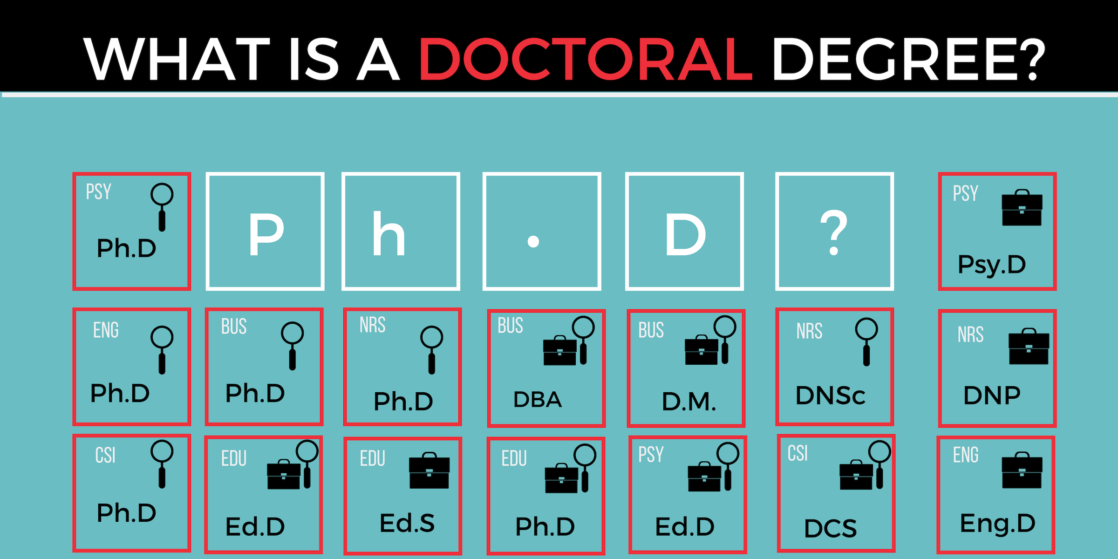
A doctorate is defined as “the highest” degree offered by a university. From the Latin docere (“to teach”), doctorates have historically been the prerequisite degree for teaching at the university level.
Today there are two broad general categories of doctoral degrees: Doctor of Philosophy degrees (Ph.D.’s), and professional doctorates (like an MD, or Doctor of Laws degree).

We’ll jump into the nuances between these degrees more below. For now, all you need to know is that doctorates can be a long and arduous process. Though obtaining a doctorate can also open more doors than any other degree level.
Obtaining a doctorate (including Ph.D.’s) often requires 3-7 years of intense research and study. The range of years often corresponds with whether or not you hold a master’s degree before seeking your doctorate. Some doctorates offer admissions to those with bachelor’s degrees and award master’s degrees part-way through the course of study. Other doctoral programs require that entrants already hold a master’s degree in a related field.
Seeking a doctoral degree can be a big commitment, that’s why OnlineCollegePlan has created a series of resources on choosing a program that works for you as well as topics such as financial aid, comparing online and in-person programs, and more.
General Doctoral and PhD FAQs
- How Can I Find The Best Online Degrees?
- What Are the Different Types Of Doctorate Degrees?
- What Are The Best Online Programs For A Doctoral Student?
- Where Can I Find Out How To Get A PhD Online?
- What Are The Best PhD Programs To Be Taken Online?
- What Is A Doctoral Degree Online Program Best Suited For?
- What Are The Fastest Degree Choices For An Online Part-Time Doctoral Student?
- How Are Doctorate Degrees Different From Each Other?

Below, we’ll proceed through more information about doctoral and PhD degrees generally. If you want to learn more about doctoral degrees in a specific academic discipline, skip to our doctoral degrees by subject section below, or proceed to one of the following subject hub pages:
- OnlineCollegePlan’s Guide to Nursing and Health Care Degrees
- OnlineCollegePlan’s Guide to Engineering Degrees
- OnlineCollegePlan’s Guide to Computer Science Degrees
- OnlineCollegePlan’s Guide to Psychology Degrees
- OnlineCollegePlan’s Guide to Education Degrees
- OnlineCollegePlan’s Guide to MBA Degrees
- OnlineCollegePlan’s Guide to Business Degrees
Can You Get a Doctorate Degree Online?

Historically, obtaining a doctoral degree required moving to the location of a university and pursuing full-time studies toward your degree. While this is still a completely viable way to earn a doctoral degree, today students have more options.
A wide range of doctoral programs is available entirely online or in hybrid formats. Fully online degrees require 0% in-person meetups, with all communication with classmates, mentors, support staff, and professors occurring online or via phone. Online learning can occur synchronously or asynchronously.
- Synchronous Online Learning involves meeting at set times for class, just like in “traditional” programs only online.
- Asynchronous Online Learning involves working through coursework on your own time. There will still be due dates, but there is no set time for you to attend a “live” class.
Most online programs are a combination of some synchronous and some asynchronous elements.
One unique aspect of doctoral degrees that lends itself to online study is that traditional doctoral programs involve a great deal of self-guided research on the part of the student. Periodic meetings with faculty advisers aid this research.

With most doctoral work occurring alone as the student works their way through the latest research in their field, there’s no reason why most of this work can’t happen online. Many students who have taken some online and some in-person graduate courses note that there’s hardly any difference between what it means to study online and what it means to be a traditional graduate student.
A further selling point of online doctoral degrees is that online degrees are often built for non-traditional and adult learners. By the time most doctoral students start pursuing their doctorate, they’re at least in their mid-twenties, and many are juggling other jobs or commitments. This type of student is exactly who online education is built to work for: students who need more flexibility.
Finally, a question many potential online students have is whether or not they obtain the same degree as an “in-person” program. This is a definitive yes. In our time researching online education at OnlineCollegePlan, we have never run into a degree program that makes any note on your diploma or transcript as to whether courses were taken online or in person. Online degrees are identical to traditional degrees offered by the same university.
Types of Doctorate Degrees
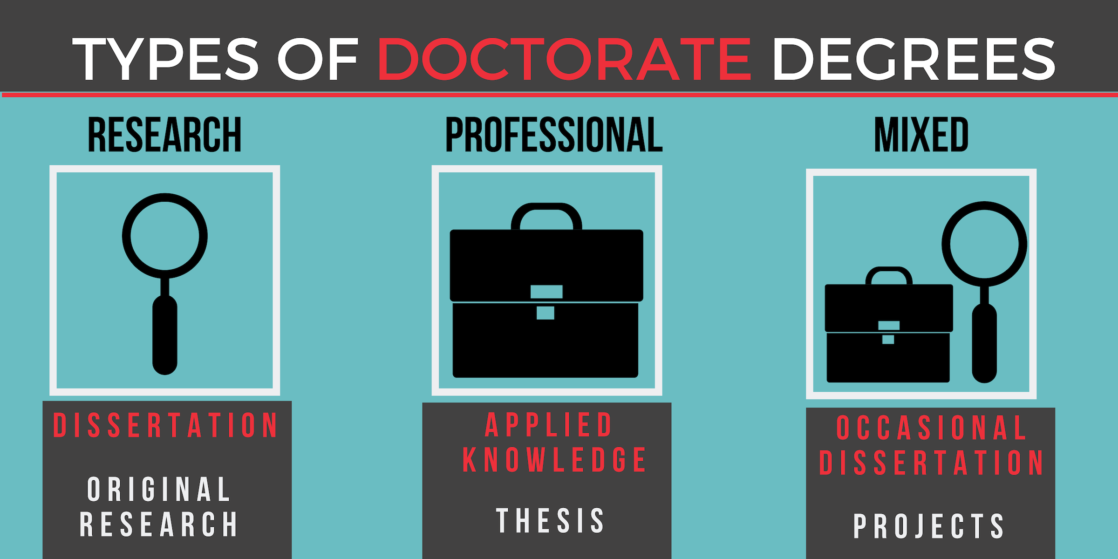
At the most general level, there are two types of doctorates: research doctorates and professional doctorates. Both may require 3-7 years (or more!) to complete, and in practice both provide opportunities to perform research and obtain professional knowledge.
The main difference between the pair is that the primary aim of a research doctorate is to craft — at least in theory — a piece of original research that is publishable in a peer-reviewed journal in your field. This research — called a dissertation — should be a meaningful addition to research in your field.
Meanwhile, the aim of the professional doctorate is to provide more applied knowledge suitable for jobs other than university teaching. While in practice, those with professional Ph.D.s do often teach in university settings, the central aim of this form of a doctorate is not to complete new research.
Whether or not you should pursue a professional or research doctorate will depend on your unique goals as well as the field you are in. Below we’ll provide some examples of both degree types.
Research Doctorates

Doctor of Philosophy (Ph.D.) degrees are research doctorates that comprise most doctoral degrees offered. While “philosophy” is in the title of the degree, recipients of the degree primarily study the subject they’re obtaining a degree in. For example, a Doctor of Philosophy in Statistics will likely primarily study statistics.
The title Doctor of Philosophy was established in the late Middle Ages when doctor meant roughly “the highest degree conferred at the university” and philosophy, drawing from its original meaning, meant “lover of knowledge.” In this sense, Doctors of Philosophy were originally given to lovers of knowledge who showed themselves worthy of the highest degree.
Today Ph.D.’s are offered in nearly every field. Though there are more specific research doctorates offered to individual fields. As mentioned above, the primary identifier of a research doctorate is not that it is a Ph.D., but that the aim of the program is to create a body of research that is publishable in a peer-reviewed journal.
Research doctorates other than Ph.D.’s include the following:
- Doctor of Education
- Doctor of Arts
- Doctor of Musical Arts
- Doctor of Professional Studies
- Doctor of Public Health
- Doctor of Social Science
- Doctor of Management
- Doctor of Business Administration
- Doctor of Engineering
- Doctor of Theology
- Doctor of Practical Theology
- Doctor of Sacred Theology
Professional Doctorate Degrees
As we mentioned above, the central aim of professional doctorates is not to produce a dissertation publishable in a peer-reviewed journal. In the U.S., professional doctorates are defined by the following characteristics:
- Requires 6+ years of study including the pre-doctoral bachelor’s degree
- Meets the academic qualifications for professional licensure in the discipline
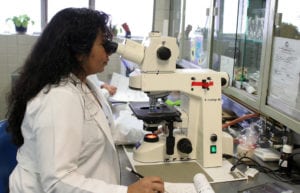
This means that degrees such as the Juris Doctor degree (a law degree) qualify as doctorates, even though they are much shorter in length than many doctorates and often do not require any substantial research or teaching. In the case of a Juris Doctor degree, students have taken 6+ years of study including undergraduate study (law degrees commonly require 3 years). Additionally, law degrees complete the academic component required to obtain licensure as a practicing lawyer. There are other components to becoming a lawyer including ethical and conduct-related components, as well as the passing of an exam, but the Juris Doctor meets the academic qualifications for professional licensure.
A list of common professional doctorates may be seen below:
- Doctor of Audiology
- Doctor of Behavioral Health
- Doctor of Chiropractic Medicine
- Doctor of Computer Science
- Doctor of Professional Studies/Counseling
- Doctor of Dental Surgery
- Doctor of Medical Dentistry
- Doctor of Health Science
- Juris Doctor
- Doctor of Jurisprudence
- Doctor of Management
- Doctor of Medicine
- Doctor of Ministry
- Doctor of Practical Theology
- Doctor of Biblical Studies
- Doctor of Counseling
- Doctor of Educational Ministry
- Doctor of Church Music
- Doctor of Pastoral Music
- Doctor of Sacred Music
- Doctor of Worship Studies
- Doctor of Naturopathic Medicine
- Doctor of Nursing Practice
- Doctor of Nurse Anesthesia Practice
- Doctor of Occupational Therapy
- Doctor of Optometry
- Doctor of Osteopathic Medicine
- Doctor of Pharmacy
- Doctor of Physical Therapy
- Doctor of Podiatric Medicine
- Doctor of Psychology
- Doctor of Social Work
- Doctor of Speech-Language Pathology
- Doctor of Veterinary Medicine
How Long Does It Take to Get a Doctorate?
The short answer is, it depends.
The length of time for obtaining a doctorate depends on the type of doctorate you’re pursuing as well as how quickly you can progress through the requirements of your program.

As mentioned above, professional doctorates require at least two years of academic study past the undergraduate level. A typical research doctorate requires four years past undergraduate study. Some research doctorates allow students with master’s in the field to bypass the first two years of the doctorate.
Four-year research doctorates require 90-120 semester credit hours of study as well as your ability to defend your dissertation.
Due to the open-ended nature of dissertation completion, it’s not unheard of for some seeking research doctorates to spend six or more years in their doctoral degree.
Within professional degrees, Doctor of Medicine (M.D.) degrees are often the longest. M.D. candidates require 4 years of schooling. For those seeking board licensure (to be a practicing doctor), years of residency and fellowships can follow, though residency is technically not a part of the doctoral program.
Juris Doctor degrees are one of the shorter professional doctorate programs. Most law degrees require 3 years of study after an undergraduate degree. Some accelerated programs are offered in 2 years.
What is a Doctoral Dissertation
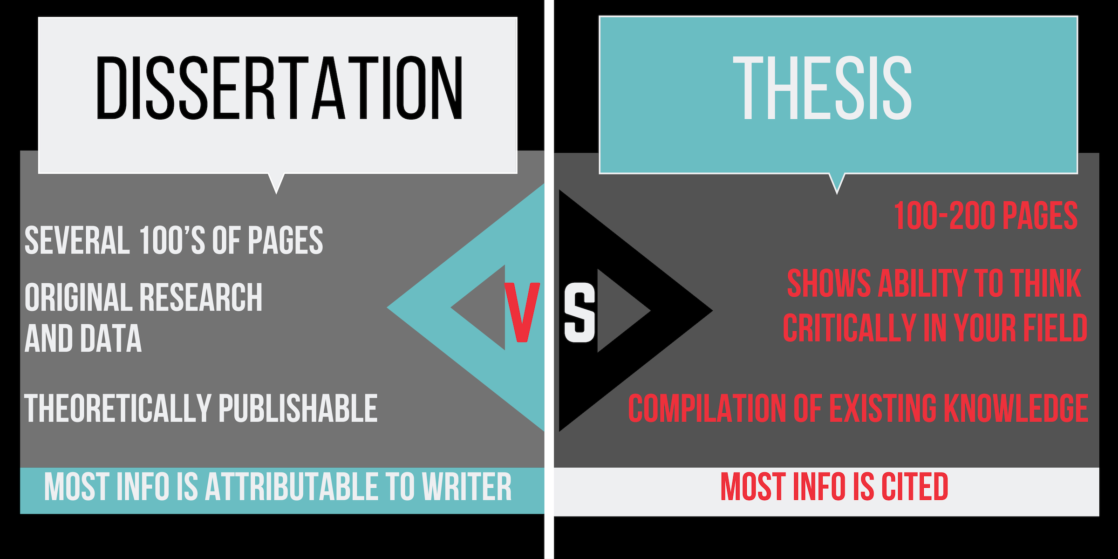
Most doctorates are research doctorates. That means that for many fields you’ll need to complete and defend a dissertation.
So what is a dissertation? A dissertation is a complex piece of original research often several hundred pages in length. This original research will require the collection and analysis of original data.
Data for your original research will be obtained from different sources depending on your field of study. For the hard sciences, you’ll likely run your own experiments in a lab. For social sciences, you may spend time in the field gathering data from interviews or social experiments. For the arts and humanities, you will likely spend time gathering data from libraries, museums, and original sources.
Once you’ve gathered this original research, you will analyze your data, report your methodology, and organize a written body of work that presents your findings. This is your dissertation. Once your dissertation is completed, successful doctoral candidates will defend their work in front of a panel of faculty at your university that knows about your subject matter.
Difference between a thesis and a dissertation
For both professional and research doctorates, a thesis may also be required. For those obtaining four-year doctorates, a thesis occurs during your masters-level coursework. Unlike a dissertation which contributes new publishable knowledge to your field of study, a thesis is a compilation of existing knowledge.
The purpose of a thesis is to show you can think critically and provide a thorough overview of topics you have studied. Where most information in a thesis is cited as the work of someone else, most information in a dissertation is attributable to the writer.
Many professional doctorates require a thesis but no dissertation.
Doctoral Degrees By Subject
While it’s important to know the basics about different types of doctoral degrees, a great deal of the choice in programs comes down to what field you’re looking to study in. Below are overviews of doctoral options in many of the most popular fields as well as links to OnlineCollegePlan’s other analysis and rankings in each area.
Education

Education is one of the most popular (and important) types of doctoral degrees. As one of the largest industry sectors in the United States, doctoral programs in education are wide-ranging. From Higher Education administration to counseling for children, to principalship for religious schools, if you’re looking to get ahead in a subdiscipline of education, there’s likely a doctorate for that.
Ph.D. in Education
Ph.D.’s in education are the only doctoral degrees in education that are always research programs (more on that in the following section). While Ph.D.’s in education are often offered in part by education schools within universities, they are often interdisciplinary and draw from faculty from throughout the university.
A Ph.D. in education offers the widest range of specialization of any doctoral degree in the field. If you know you want your work to culminate in a substantial body of research, or you know your area of research is uncommon, a Ph.D. in education is often the way to go.
Some specializations offered by many schools in this degree type include the following:
- Counseling and Development
- Early Childhood Education
- Early Childhood Special Education
- Educational Leadership
- Education Policy
- Educational Psychology
- Exercise, Fitness, and Health Promotion
- Higher Education
- International Education
- International Education
- Learning Technologies Design Research
- Literacy and Reading
- Mathematics Education Leadership
- Multilingual/Multicultural Education
- Research Methodology
- Science Education Research
- Special Education
- Teaching and Teacher Education
Already know you want to pursue a Ph.D. in Education? Check out our rankings of:
- Top 10 Online PhD Programs in Online Teaching
- Top 5 PhDs in Early Childhood Education
- The Best Online Ph.D. in Education Degree Programs
- Top 15 Online PhDs in Higher Education.
- Top 30 Online PhD Programs in Curriculum & Instruction
- Top Online PhD Programs in Special Education
- Top 5 Online PhD Programs in Elementary Education

Doctor of Education
The history of Doctor of Education (Ed.D.) degrees is a confusing one. At some universities, it’s viewed as a professional doctorate, while at others a research doctorate. Adding more confusion to this distinction is the fact that two of the largest organizations for categorizing doctorates disagree as to what type of doctorate the doctor of education is.
At the end of the day, what determines the “type” of this doctorate more than anything is whether the degree requires candidates to “generate new knowledge” in the form of a publishable paper. If you are specifically looking for a research or professional doctorate, make sure to double-check with universities offering Doctor of Education degrees.
With all this aside, Doctor of Education degrees generally take as long as Ph.D. programs. They tend to focus on practical specializations that include the following:
- Counseling
- Curriculum and instruction/curriculum and teaching
- Educational Administration
- Education policy
- Educational psychology
- Educational technology
- Higher education
- Human resource development
- Language/linguistics
- Leadership or technology/innovation in instruction
If you’re looking for a top-ranked online Doctor of Education degree, check out our coverage of the top-ranked online Ed.D. degrees and the best online doctoral programs in educational leadership today.
For more information on careers in educational leadership, check out our FAQ:
Educational Specialist Programs
Though not quite doctoral degrees, Educational Specialist (Ed.S.) programs are beyond the master’s level. These professional graduate degrees in education generally require 60 credit hours past the master’s level and are included in some educational doctoral programs.
Educational Specialist programs do not require a dissertation, though they are considered terminal degrees in the field of education.
Nursing and Healthcare
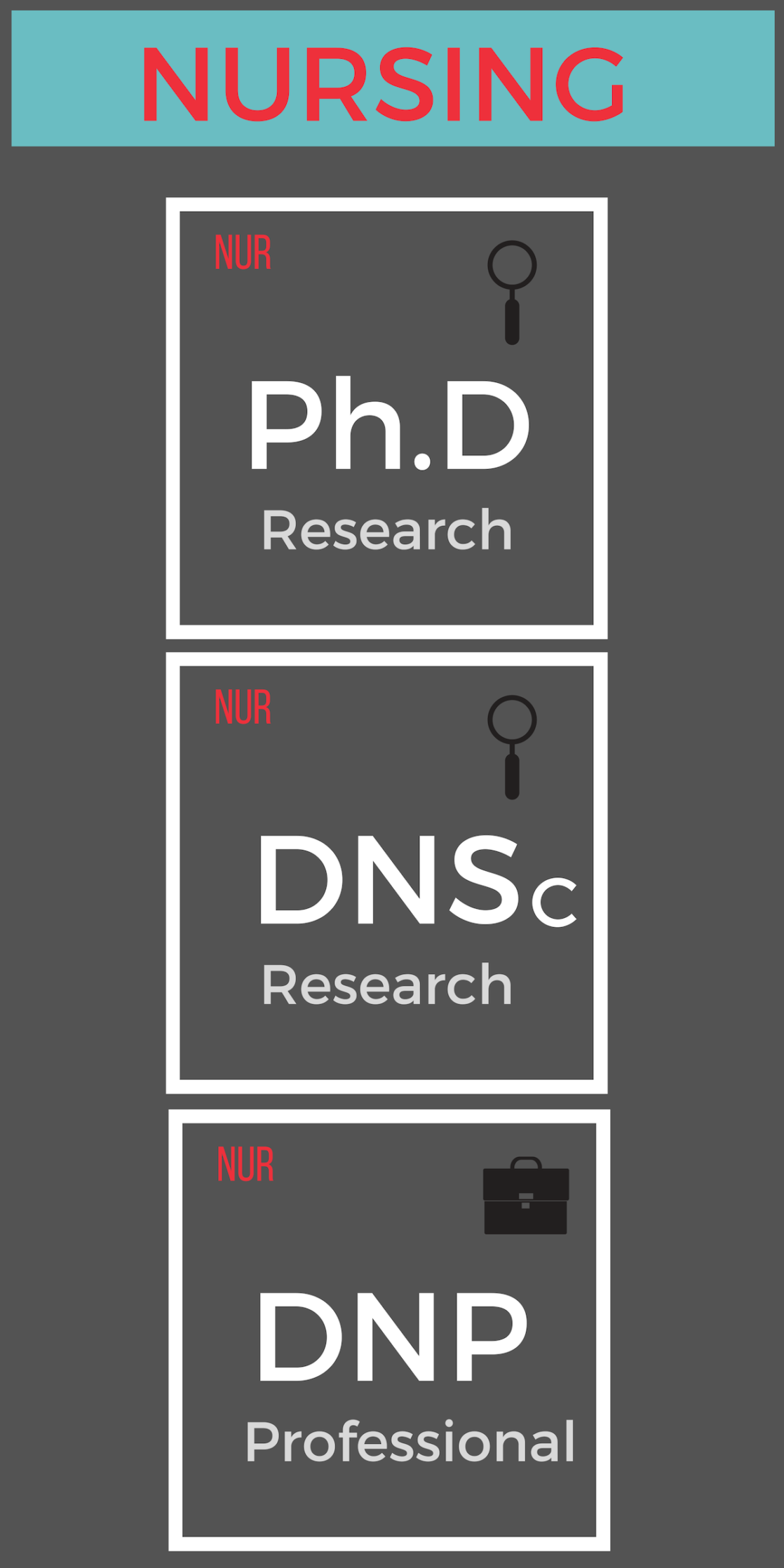
There are three main terminal, doctoral degrees available in the field of nursing. The Doctor of Nursing Practice (DNP), the Doctor of Nursing Science (DNSc), and the Ph.D. in Nursing. The differences between these degree types boil down to the following:
- The Doctor of Nursing Science and Ph.D. in Nursing are research doctorates.
- The Doctor of Nursing Practice is a professional doctorate.
- The Doctor of Nursing Science and Doctor of Nursing Practice are often offered entirely by the school of nursing in a university.
- Ph.D. in Nursing programs are often interdisciplinary, drawing from many branches of the university.
Most doctorate programs related to nursing require a master’s in nursing of some sort, though there are a small number of schools that offer bachelor’s to nursing doctorate programs.

While the variety of doctoral types may seem convoluted, one can begin to discern the proper programs by considering some of the following. Are you trying to work in academia or research settings, or are you trying to work in a clinical setting? If you would like to work in clinical settings, you should likely pursue a DNP or DNSc. These degrees allow you to specialize in a given area of nursing. They focus on the most recent research, but not on research methodology.
If you want to contribute your own unique research to the field of nursing or teach others nursing, then a Ph.D. in nursing is likely the right program for you.
For more discussion of different nursing doctoral degrees, check out the following FAQs:
- What are the Best Doctorate Degrees in Nursing?
- What Jobs Are Best Suited for a Doctorate Vs. Ph.D. in Nursing?
- How Long Does it Take to Get a Ph.D. in Nursing?
- Where Can I Earn a Doctorate in Nursing As a Part-Time Student?
If you already know you may be interested in a doctorate in nursing or healthcare, be sure to check out our rankings:
- Best Online Colleges With Ph.D. in Nursing Programs
- 10 Best Online Doctor of Health Science Degrees
- The 25 Best Online Doctorates in Occupational Therapy
- The Best 20 Online Doctorates in Healthcare Leadership Degrees
- Top 25 Online PhDs in Nursing Education
- Top 15 Online Doctorate Degrees in Healthcare Administration
Business

On the one hand, there aren’t many “business” jobs for which having a doctorate is a prerequisite. On the other, “business” means many things, which in turn means many topics and doctoral degree types that may apply.
Generally speaking, there are three main degree types centered on business at the doctoral level: a Doctor of Management degree, a Doctor of Business Administration, or a Ph.D. in some business-related discipline.
 While all three business doctorate types can be research doctorates requiring dissertations, the Doctor of Management is the most likely to be an applied or professional program. When Doctor of Management programs require dissertations, they are often focused on applied knowledge of management. More often, however, Doctor of Management degrees replace a dissertation requirement with applied research projects.
While all three business doctorate types can be research doctorates requiring dissertations, the Doctor of Management is the most likely to be an applied or professional program. When Doctor of Management programs require dissertations, they are often focused on applied knowledge of management. More often, however, Doctor of Management degrees replace a dissertation requirement with applied research projects.Doctor of Business Administration degrees are research doctorates that are viewed as comparable with Ph.D.’s in Business Administration. Either a DBA or a Ph.D. in Business Administration fulfills the
requirements for gaining tenure-track employment as a university instructor. Finally, Ph.D. programs in Business fields can be taken in a wide variety of disciplines. Broadly speaking, economics, psychology, human resources, accounting, management, and business administration (among others) may all be pursued through a Ph.D. for business goals. We have ranked the top online doctoral programs in organizational leadership, which is versatile and can be considered a business degree. For more information on doctoral business degrees, check out our FAQs: What Kind of Doctoral Programs in Business Are There? Where is the best place to find an online Ph.D. Business Administration Program? What Can You Do With an Organizational Leadership Degree? If you already know you would like to pursue a doctoral program in business, be sure to check out our rankings of top online Ph.D. programs: The best Ph.D. in Business Programs offered online Top Online PhDs in Finance Top Online PhDs in Accounting Top Online PhDs in Management Top 5 Human Resources Management Doctorate Programs Online Best Online Doctorate in International Business Top Online PhDs in Project Management Best Online Ph.D. in Entrepreneurship Top 5 Online PhD Programs in Sports Management Top Online PhD Programs in Marketing 10 Best Online DBA Programs The Best Online Doctorate Programs in Organizational Leadership 10 Best Online PhD Programs in Management Information Systems The Best Online PhD in Training & Development Degrees Top Online PhDs in Communications Top Online PhD Programs in Criminal Justice The Best Online PhD in Public Administration and Doctorate Degree Programs Psychology While there are jobs in psychology that do not need a doctorate, doctorates in psychology open up a vast array of jobs in counseling, therapy, human services, business, education research, and academia. Of doctoral degrees, the two that focus the most on psychology are the Doctor of Psychology (PsyD) degree and a Ph.D. in Psychology. Additionally, Ph.D.’s are available in many related fields as well as Ed.D. programs focusing on school counseling, child counseling, and related educational applications. The main difference between a Ph.D. in Psychology and a Doctor of Psychology degree is that the Ph.D. helps students to get into research and potential university positions. The Psy.D. degree is focused on practical applications of psychological practices including counseling, social work, consulting, and more.
While there are jobs in psychology that do not need a doctorate, doctorates in psychology open up a vast array of jobs in counseling, therapy, human services, business, education research, and academia. Of doctoral degrees, the two that focus the most on psychology are the Doctor of Psychology (PsyD) degree and a Ph.D. in Psychology. Additionally, Ph.D.’s are available in many related fields as well as Ed.D. programs focusing on school counseling, child counseling, and related educational applications. The main difference between a Ph.D. in Psychology and a Doctor of Psychology degree is that the Ph.D. helps students to get into research and potential university positions. The Psy.D. degree is focused on practical applications of psychological practices including counseling, social work, consulting, and more.  Psy.D. degrees are traditionally slightly easier to get into, often don’t require dissertations, and take slightly less time to complete. Where a Ph.D. in Psychology commonly takes 5-8 years to complete, many Psy.D. programs require 4-6 years. For many Ph.D. in Psychology programs that occur in-person, tuition is waived in exchange for teaching classes and being a research assistant. This is not the case for the Psy.D. degree. If you would like to read through more in-depth discussions of psychology doctoral degrees, check out our related FAQ pieces. How is a Ph.D. in Psychology Better Than a Master’s Degree? How Long Does It Take to Get a Ph.D. in Psychology? Can I Earn a Doctorate Degree in Psychology Part-Time? Where Can I Find a Program for an Online Ph.D. in Psychology? If you already know you might be interested in a doctoral degree in psychology, make sure to check out OnlineCollegePlan’s rankings of the top online Ph.D. programs in psychology and the Best 10 Online Doctoral Programs in Marriage and Family Counseling.
Psy.D. degrees are traditionally slightly easier to get into, often don’t require dissertations, and take slightly less time to complete. Where a Ph.D. in Psychology commonly takes 5-8 years to complete, many Psy.D. programs require 4-6 years. For many Ph.D. in Psychology programs that occur in-person, tuition is waived in exchange for teaching classes and being a research assistant. This is not the case for the Psy.D. degree. If you would like to read through more in-depth discussions of psychology doctoral degrees, check out our related FAQ pieces. How is a Ph.D. in Psychology Better Than a Master’s Degree? How Long Does It Take to Get a Ph.D. in Psychology? Can I Earn a Doctorate Degree in Psychology Part-Time? Where Can I Find a Program for an Online Ph.D. in Psychology? If you already know you might be interested in a doctoral degree in psychology, make sure to check out OnlineCollegePlan’s rankings of the top online Ph.D. programs in psychology and the Best 10 Online Doctoral Programs in Marriage and Family Counseling.Engineering

Doctoral degrees in engineering are some of the most versatile doctoral degrees out there. They can ensure career stability (above and beyond what is already a stable field), promote you to project expert, help you to gain appointment as a university teacher in engineering, help you join cutting-edge research teams, or help you reach upper management in engineering.
 Degrees” width=”300″ height=”116″ />While typically a bachelor’s degree in engineering will get you in the door at most engineering employers, there are many public and private settings where advanced degrees are the norm.
Degrees” width=”300″ height=”116″ />While typically a bachelor’s degree in engineering will get you in the door at most engineering employers, there are many public and private settings where advanced degrees are the norm.Top research settings at universities, for private corporations, or in consulting roles can all pay quite handsomely. And talented engineers are always in demand.
Or, if your research points to a new opportunity, you can always start your own business. Engineers are one of the most common degree types for those who found their own companies.
 Generally speaking, there are two doctoral degree paths in engineering: a Ph.D. in Engineering, and a Doctor of Engineering Degree. Ph.D.’s in engineering are research degrees that require the writing of a dissertation providing unique research that furthers the field. Often Ph.D.’s take longer to complete than Doctor of Engineering degrees and prepare students to take on university teaching roles and research.
Generally speaking, there are two doctoral degree paths in engineering: a Ph.D. in Engineering, and a Doctor of Engineering Degree. Ph.D.’s in engineering are research degrees that require the writing of a dissertation providing unique research that furthers the field. Often Ph.D.’s take longer to complete than Doctor of Engineering degrees and prepare students to take on university teaching roles and research.Doctor of Engineering degrees are professional doctorates that often require hands-on projects instead of a dissertation. These applied degrees often seek to keep recipients up-to-date with the latest industry technologies and practices.
While both degrees can lead to work in a university, public, or corporate setting, the Doctor of Engineering is more common away from university settings.
Within both doctoral degree types, a wide range of specializations may be endeavored upon. A short list of engineering specializations is below:
- Biological/Chemical Engineering
- Chemical Engineering
- Computer Engineering
- Civil Engineering
- Electrical and Computer Engineering
- Engineering Management
- Environmental Engineering
- Geological Engineering
- Information Science and Engineering
- Industrial Engineering
- Instrumentation Engineering
- Integrated Engineering
- Manufacturing Engineering
- Materials Engineering
- Mechanical Engineering
- Mining Engineering
- Nuclear Engineering
- Robotics and Automation Engineering
- Structural Engineering
- Software Engineering
If you would like to find more in-depth coverage of engineering doctorates or engineering degrees generally, check out our engineering degree hub page.
If you already know you’re interested in a doctorate in engineering, make sure to take a look at our rankings of Top Online Ph.D. Programs in Engineering Management, the best online chemical engineering programs, and the best online civil engineering programs.
Computer Science
 Computer Science” />
Computer Science” />Computer science is the background theory, implementation, and design of computing systems. This multidisciplinary field is wide-ranging, meaning that there are many specializations at the doctoral level.
While most master’s-level computer science degrees are practical, doctoral programs also offer theoretical fields of study. An example of this would be computational complexity theory. An applied field could deal with computer vision, making of processing units, programming languages, algorithms and data structures, and so forth.
 At the doctoral level there are two primary degrees in Computer Science. The Doctor of Computer Science degree is an applied research degree that requires 3 years of study at the post-master’s level. A Ph.D. in Computer Science is also a research degree, but to a greater extent. Where a Doctor of Computer Science requires three years of study with one year on a dissertation, a Ph.D. in Computer Science requires four or more years of study with three or more years spent on the dissertation. Additionally, a Doctor of Computer Science degree stresses practical applications more, while a Ph.D. is meant to prepare students to teach at the university level.
At the doctoral level there are two primary degrees in Computer Science. The Doctor of Computer Science degree is an applied research degree that requires 3 years of study at the post-master’s level. A Ph.D. in Computer Science is also a research degree, but to a greater extent. Where a Doctor of Computer Science requires three years of study with one year on a dissertation, a Ph.D. in Computer Science requires four or more years of study with three or more years spent on the dissertation. Additionally, a Doctor of Computer Science degree stresses practical applications more, while a Ph.D. is meant to prepare students to teach at the university level.Want to explore more in-depth discussion of computer science doctorates? Check out our FAQ pages:
- Is Online College for Computer Science a Bad Idea?
- Why Should I Get a Ph.D. in Computer Science?
- What are the Best Online Computer Science Degrees Including Doctoral Level?
- How Long Does it Take to Get a Ph.D. in Computer Science Online?
- What Kind Of Jobs Need a Ph.D. in Computer Science?
- Where is the Best Place to Earn an Online Ph.D. in Computer Science Degree?
If you think you are ready to take the leap and start looking at schools, check out our rankings of the best online Ph.D. in Computer Science programs, Top Online PhD Programs in Computer & Information Systems Security, and the Top Online PhDs in Homeland Security.
All PhD and Doctorate Degree Online College Rankings
- Top 20 Fastest Online Doctoral Programs
- Top 20 Best Colleges With Online PhD Programs
- Top 5 Online Colleges with the Best PhD in Public Health
- Top 10 Online Colleges with the Best PhD in Business
- 10 Best Online Doctorate in International Business
- Top 20 Nurse Practitioner Schools Online
- Top 20 Online Colleges with the Best PhD in Education or EdD
- Top 20 Online Colleges with the Best PhD in Psychology
- Top 5 Online Colleges with the Best PhD in Computer Science
- Top 30 Online Colleges with the Best PhD in Nursing
- The Best Online PhD in Public Administration and Doctorate Degree Programs
- 10 Best Online PhD Programs in Management Information Systems
- The Best Online PhD in Training & Development Degrees
- Top Online PhDs in Finance
- Top Online PhDs in Accounting
- Top Online PhD Programs in Management
- Top Online PhDs in Project Management
- Top Online PhDs in Homeland Security
- Top 25 Online PhDs in Nursing Education
- Top Online PhDs in Communications
- Top Online PhD Programs in Entrepreneurship
- Top 15 Online PhDs in Higher Education
- Top Online PhD Programs in Marketing
- The 25 Best Online Doctorates in Occupational Therapy
- 10 Best Online Doctor of Health Science Degrees
- The Best 20 Online Doctorates in Healthcare Leadership Degrees
- Top 15 Online Doctorate Degrees in Healthcare Administration
- Top Online PhD Programs in Criminal Justice
- Top Online PhD Programs in Engineering Management
- Top 10 Online PhD Programs in Online Teaching
- Top 5 PhDs in Early Childhood Education
- The Best 20 Online Doctoral Programs in Ministry
- 10 Best Online DBA Programs
- Best 10 Online Doctoral Programs in Marriage and Family Counseling
- Top 30 Online PhD Programs in Curriculum & Instruction
- Top Online PhD Programs in Special Education
- Top Online PhD Programs in Computer & Information Systems Security
- Top 5 Online PhD Programs in Elementary Education
- Top 5 Online PhD Programs in Sports Management
- Top 5 Human Resources Management Doctorate Programs Online
- Top 20 Online Doctoral Programs in Organizational Leadership
- Top 25 Online Doctoral Programs in Educational Leadership
- Top 20 Best Medical Schools
- Top 20 Online Law School Options
More from OnlineCollegePlan
We’ve ranked the Top 100 Best Online Colleges which offer online courses and programs to make it easy for you to find the top schools. You may also be interested to find a school nearby which offers online courses with our Best Online Colleges or Universities by Location.
Be sure to also check out our Ultimate Guide to Online Colleges.


 While all three business doctorate types can be research doctorates requiring dissertations, the Doctor of Management is the most likely to be an applied or professional program. When Doctor of Management programs require dissertations, they are often focused on applied knowledge of management. More often, however, Doctor of Management degrees replace a dissertation requirement with applied research projects.
While all three business doctorate types can be research doctorates requiring dissertations, the Doctor of Management is the most likely to be an applied or professional program. When Doctor of Management programs require dissertations, they are often focused on applied knowledge of management. More often, however, Doctor of Management degrees replace a dissertation requirement with applied research projects.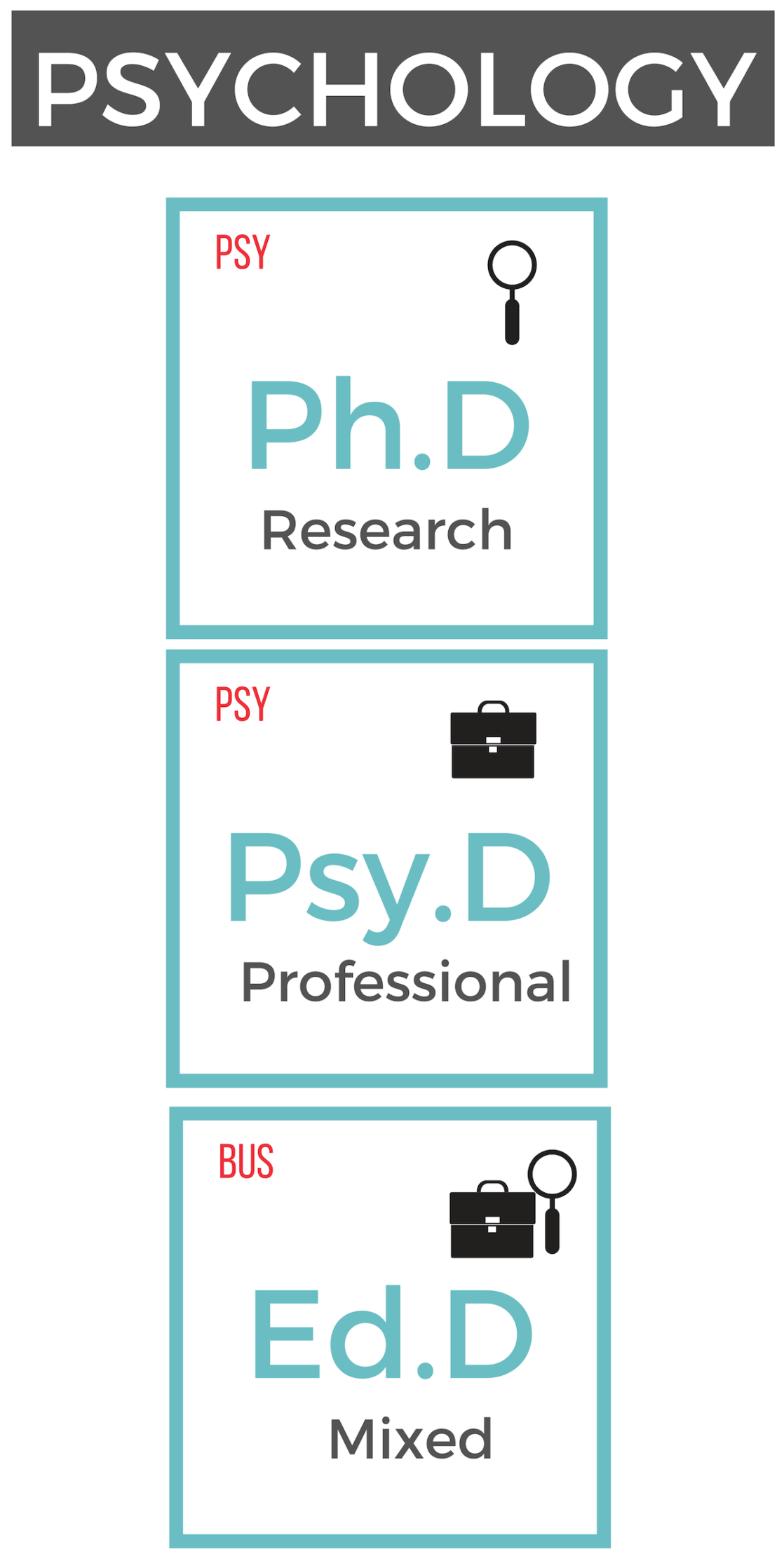 While there are jobs in psychology that do not need a doctorate, doctorates in psychology open up a vast array of jobs in counseling, therapy, human services, business, education research, and academia. Of doctoral degrees, the two that focus the most on psychology are the Doctor of Psychology (PsyD) degree and a Ph.D. in Psychology. Additionally, Ph.D.’s are available in many related fields as well as Ed.D. programs focusing on school counseling, child counseling, and related educational applications. The main difference between a Ph.D. in Psychology and a Doctor of Psychology degree is that the Ph.D. helps students to get into research and potential university positions. The Psy.D. degree is focused on practical applications of psychological practices including counseling, social work, consulting, and more.
While there are jobs in psychology that do not need a doctorate, doctorates in psychology open up a vast array of jobs in counseling, therapy, human services, business, education research, and academia. Of doctoral degrees, the two that focus the most on psychology are the Doctor of Psychology (PsyD) degree and a Ph.D. in Psychology. Additionally, Ph.D.’s are available in many related fields as well as Ed.D. programs focusing on school counseling, child counseling, and related educational applications. The main difference between a Ph.D. in Psychology and a Doctor of Psychology degree is that the Ph.D. helps students to get into research and potential university positions. The Psy.D. degree is focused on practical applications of psychological practices including counseling, social work, consulting, and more.  Psy.D. degrees are traditionally slightly easier to get into, often don’t require dissertations, and take slightly less time to complete. Where a Ph.D. in Psychology commonly takes 5-8 years to complete, many Psy.D. programs require 4-6 years. For many Ph.D. in Psychology programs that occur in-person, tuition is waived in exchange for teaching classes and being a research assistant. This is not the case for the Psy.D. degree. If you would like to read through more in-depth discussions of psychology doctoral degrees, check out our related FAQ pieces. How is a Ph.D. in Psychology Better Than a Master’s Degree? How Long Does It Take to Get a Ph.D. in Psychology? Can I Earn a Doctorate Degree in Psychology Part-Time? Where Can I Find a Program for an Online Ph.D. in Psychology? If you already know you might be interested in a doctoral degree in psychology, make sure to check out OnlineCollegePlan’s rankings of the top online Ph.D. programs in psychology and the
Psy.D. degrees are traditionally slightly easier to get into, often don’t require dissertations, and take slightly less time to complete. Where a Ph.D. in Psychology commonly takes 5-8 years to complete, many Psy.D. programs require 4-6 years. For many Ph.D. in Psychology programs that occur in-person, tuition is waived in exchange for teaching classes and being a research assistant. This is not the case for the Psy.D. degree. If you would like to read through more in-depth discussions of psychology doctoral degrees, check out our related FAQ pieces. How is a Ph.D. in Psychology Better Than a Master’s Degree? How Long Does It Take to Get a Ph.D. in Psychology? Can I Earn a Doctorate Degree in Psychology Part-Time? Where Can I Find a Program for an Online Ph.D. in Psychology? If you already know you might be interested in a doctoral degree in psychology, make sure to check out OnlineCollegePlan’s rankings of the top online Ph.D. programs in psychology and the 
 Degrees” width=”300″ height=”116″ />While typically a bachelor’s degree in engineering will get you in the door at most engineering employers, there are many public and private settings where advanced degrees are the norm.
Degrees” width=”300″ height=”116″ />While typically a bachelor’s degree in engineering will get you in the door at most engineering employers, there are many public and private settings where advanced degrees are the norm. Generally speaking, there are two doctoral degree paths in engineering: a Ph.D. in Engineering, and a
Generally speaking, there are two doctoral degree paths in engineering: a Ph.D. in Engineering, and a 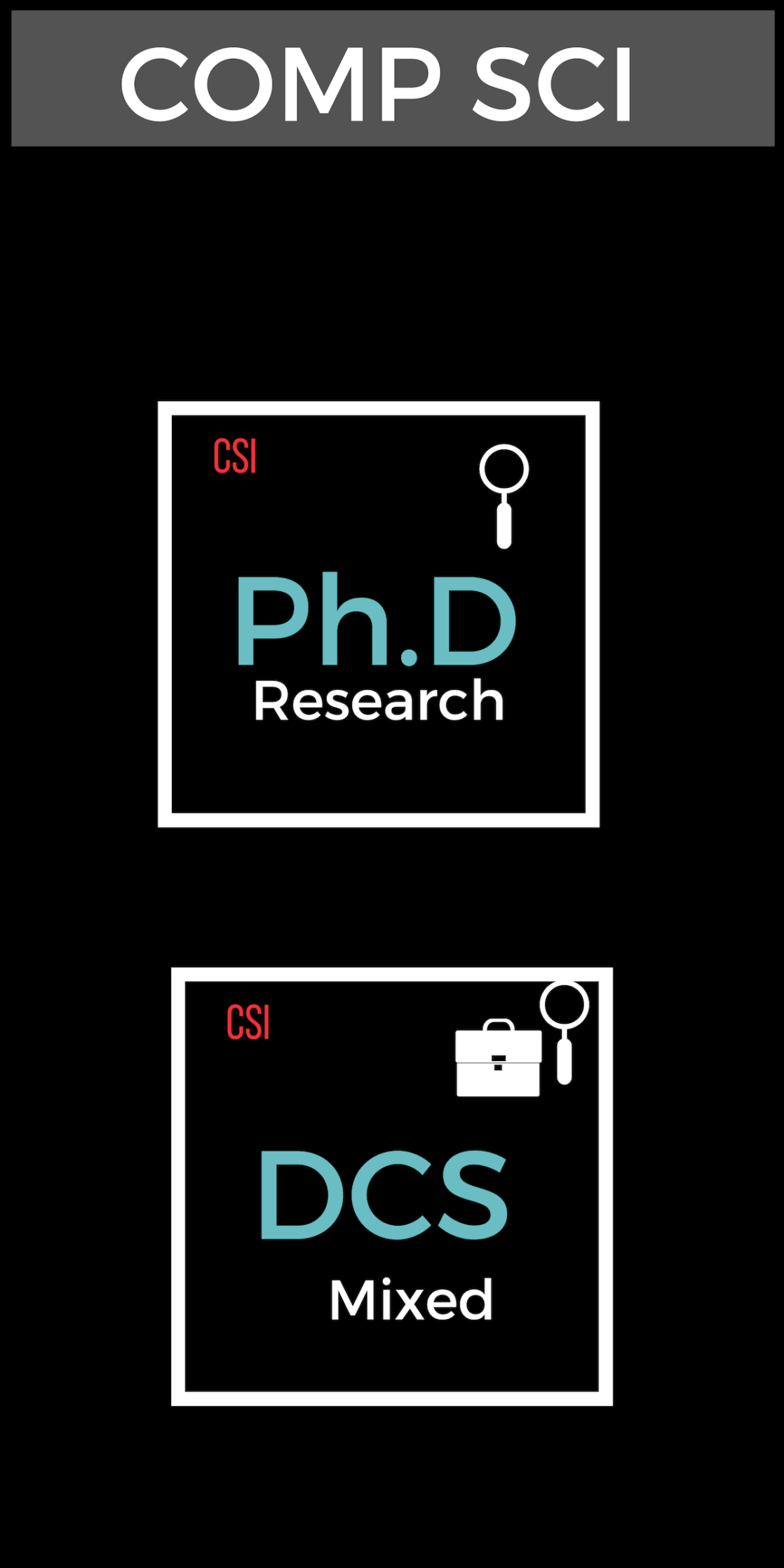 Computer Science” />
Computer Science” /> At the doctoral level there are two primary degrees in
At the doctoral level there are two primary degrees in